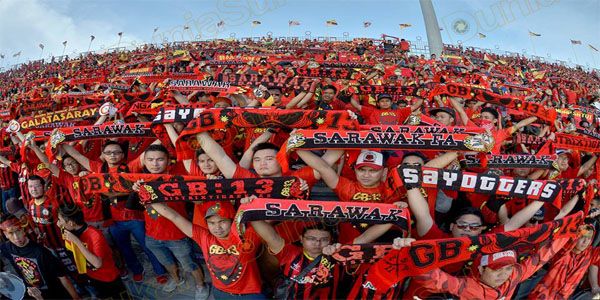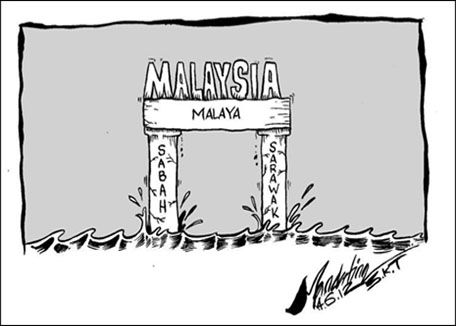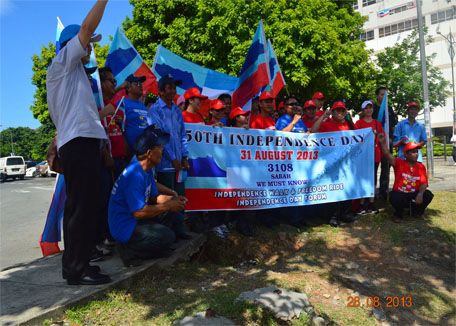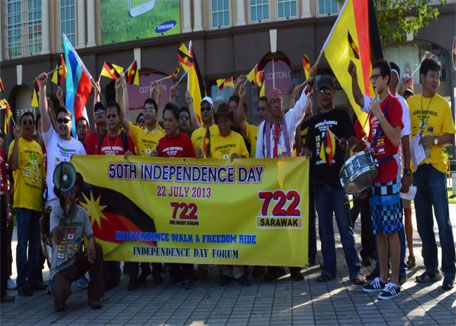13 November 2013
PRESS STATEMENT: “Imagine Musa Tabling a RM40 Billion 2014 Sabah Budget” - DATUK DR. JEFFREY KITINGAN : CLICK HERE
|
Datuk Dr. Jeffrey Kitingan is the Chairman of STAR Sabah and State Assemblymen for N33, Bingkor, Sabah.
He also contested in P180, Keningau garnering 11900 strong votes
|
Vote for STAR!
Only STAR Party can protect and bring back the Truly concept of Independence and Sovereign Country!
Sarawak for Sarawakian!
The Spirit of Sarawak for Sarawakian is getting stronger everyday!
Is this Sabah and Sarawak fate?
Sabah and Sarawak were promised to have a Self-Government. But what happen after 50 years forming The Federation of Malaysia?
Sabah 50th Independence Day
Sabah or formerly known as North Borneo was granted an Independence by British on 31 August 1963
Sarawak 50th Independence Day
Sarawak was granted Independence by British on 22 July 1963
Sunday, 17 November 2013
Sabah sets RM1.58 bil budget for 2014 - "PITTANCE 2014 BUDGET FOR SABAH"
GST a second ‘vampire bite’ for Sabahans - Sabah MP Jimmy Wong echoing DATUK DR. JEFFREY KITINGAN
28 October 2013
Datuk Dr. Jeffrey Kitingan is the Chairman of STAR Sabah and State Assemblymen for N33, Bingkor, Sabah.
He also contested in P180, Keningau garnering 11900 strong votes
|
Already drained by the higher cost of living as a result of the 33-year old carbotage, Sabahans now face the 'fangs' of GST, said Sabah MP Jimmy Wong.
KOTA KINABALU: First time MP Jimmy Wong has likened the Goods and Services Tax (GST) as the second ‘vampire’ that will “Gigit Sampai Tulang” (bite to the bone) of the people of Sabah.
In his maiden Budget speech at Parliament, Wong said the first vampire was the Cabotage Policy which has been sucking the blood of the people for the last 33 years.
The only cure, he said, is to exempt Sabah from the GST as its citizens have the lowest purchasing power in the country.
Wong noted that the average monthly household income in Sabah in 2012 was only RM4,013 compared to the national average of RM5,000.
“In fact, if we take into consideration the cost of living in Sabah, which is about 30% higher than in Semenanjung, the household monthly income in Sabah is only about RM2,800.
“This makes Sabah as the state with the lowest purchasing power in the country, therefore I disagree for the GST to be implemented in Sabah,” said the Kota Kinabalu MP.
Wong also urged the government to abolish the Cabotage Policy that has been enforced in Sabah for 33 years and had been identified as the main factor for the higher price of goods in Sabah by as much as 20% to 30% more than in the peninsula.
“This Cabotage Policy has been like a vampire that has been sucking the blood from the people of Sabah.
“We can imagine what will happen to a person whose blood is being sucked continuously for more than 30 years,” he said.
Wong also said the government’s price standardisation programme had failed to lower the price of goods in Sabah because the actual issue that must be addressed is the Cabotage Policy.
“Coupled with the GST proposal to be implemented by April 2015 it means the people of Sabah are like “sudah jatuh di timpa tangga” (double trouble).
“GST and the Cabotage Policy will be very lethal to the people of Sabah’s economy. GST is a second vampire that will “Gigit Sampai Tulang” (bite to the bone) of every Sabahan,” he said.
Facebook Page: STAR, Sarawak
Facebook Page: STAR N38 JEMORENG
Facebook Group: STAR N38 JEMORENG
Facebook Page: STAR P207 IGAN
By, Rajah Raqafluz
SARAWAK Homeland Security in the making?
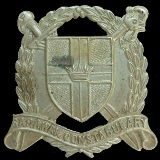 |
| Sarawak Constabulary Badge |
Ia akan dibincangkan dalam seminar eksklusif pemerkesaan pendakwaan syariah peringkat kebangsaan (SEPP).
KUCHING: Kerajaan Sarawak akan membincangkan kemungkinan membekalkan senjata api kepada anggota penguatkuasa dan pendakwa Jabatan Agama Islam Sarawak (Jais).
Ia akan dibincangkan dalam seminar eksklusif pemerkesaan pendakwaan syariah peringkat kebangsaan (SEPP).
Menteri Muda Hal Ehwal Islam Datuk Haji Daud Abdul Rahman berkata, perkara itu perlu kerana keselamatan anggota pasukan penguatkuasa dan pendakwa terdedah dengan ancaman bahaya seperti yang berlaku di Pahang baru-baru ini.
“Kerajaan mengambil serius soal keselamatan anggota penguatkuasan dan mahu bukan sahaja diri mereka, tetapi juga ahli keluarga dalam keadaan yang terjamin,” tegasnya.
Beliau berkata demikian pada sidang media selepas merasmikan seminar berkenaan di sebuah hotel terkemuka, di sini, hari ini.
Menurutnya, sesetangah negeri seperti di Terengganu mula mengambil langkah membekalkan pasukan penguatkuasanya dengan senjata untuk menjaga keselamatan semasa menjalankan tugas.
“Kemungkinan di dalam seminar ini, perkara tersebut akan dibincangkan sama ada ia sesuai atau tidak untuk diaplikasikan di negeri kita.
“Ia kerana kita mahu keselamatan ahli keluarga diberi kepentingan yang sama agar kehidupan mereka berlangsung dengan aman tanpa gangguan yang membahayakan,” ujarnya.
Tindakan negatif
Daud yang juga Menteri Muda Pembangunan Infrastruktur menasihati rakyat yang mempunyai tanggapan yang salah terhadap tugasan anggota pasukan JAIS untuk mengubahnya dan memahami dengan jelas sebelum melakukan tindakan negatif.
Katanya, pegawai penguatkuasa dan pendakwa hanya menjalankan tugas yang diamanahkan kerana mahu semuanya berjalan dengan baik.
“Sehubungan itu, saya berharap aspek keselamatan mereka diperketatkan dan menjadi salah satu resolusi pada seminar ini,” tambahnya.
Dalam perkembangan lain, Sarawak kini dalam proses untuk mendapatkan kelulusan naik taraf menjadi sebuah Jabatan Pendakwaan Syariah.
“Dengan adanya penjabatanan ini, ia dapat meningkatkan keupayaan bahagian pendakwaan syariah dan seterusnya memartabatkan undang-undang Syariah di Sarawak,” katanya.
Beliau mensasarkan proses tersebut mengambil masa selama enam bulan dan dijangka akan diluluskan pada tahun hadapan.
Facebook Page: STAR, Sarawak
Facebook Page: STAR N38 JEMORENG
Facebook Group: STAR N38 JEMORENG
Facebook Page: STAR P207 IGAN
By, Rajah Raqafluz
Pemimpin muda Umno panaskan hubungan Putrajaya dan Sarawak - Tan Sri Dr James Masing
Pemimpin muda Umno panaskan hubungan Putrajaya dan Sarawak
 |
| Menteri Pembangunan Tanah Sarawak, Tan Sri Dr James Masing |
Facebook Page: STAR, Sarawak
Facebook Page: STAR N38 JEMORENG
Facebook Group: STAR N38 JEMORENG
Facebook Page: STAR P207 IGAN
By, Rajah Raqafluz
Surat Rasmi kepada Queen Elizabeth, Ketua Negara-negara Commonwealth - "Nations Without States"
Facebook Page: STAR, Sarawak
Facebook Page: STAR N38 JEMORENG
Facebook Group: STAR N38 JEMORENG
Facebook Page: STAR P207 IGAN
By, Rajah Raqafluz
PRESS STATEMENT: “Imagine Musa Tabling a RM40 Billion 2014 Sabah Budget” - DATUK DR. JEFFREY KITINGAN
Datuk Dr. Jeffrey Kitingan is the Chairman of STAR Sabah and State Assemblymen for N33, Bingkor, Sabah.
He also contested in P180, Keningau garnering 11900 strong votes
|
Facebook Page: STAR, Sarawak
Facebook Page: STAR N38 JEMORENG
Facebook Group: STAR N38 JEMORENG
Facebook Page: STAR P207 IGAN
By, Rajah Raqafluz
Sabah foreign intrusion proves the failure of Putrajaya’s security zone - DATUK DR. JEFFREY KITINGAN
Datuk Dr. Jeffrey Kitingan is the Chairman of STAR Sabah and State Assemblymen for N33, Bingkor, Sabah.
He also contested in P180, Keningau garnering 11900 strong votes
|

